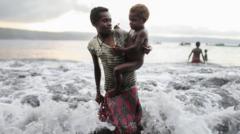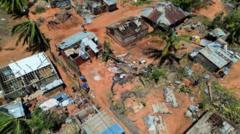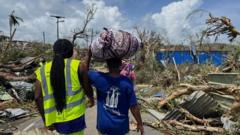The International Court of Justice is poised to clarify legal obligations of governments regarding the climate crisis, with implications for future lawsuits.
**UN's International Court of Justice Begins Landmark Climate Change Hearing**

**UN's International Court of Justice Begins Landmark Climate Change Hearing**
Significant case addresses nations' legal responsibilities for climate action and damages.
The International Court of Justice (ICJ) in The Hague has commenced hearings in a pivotal case that could delineate the legal responsibilities of nations concerning climate change. Nearly 100 nations, including Vanuatu—an island nation particularly vulnerable to climate impacts—are providing testimony as the court seeks to address essential questions about what actions countries must undertake to combat climate change and how they should rectify damage associated with its effects.
Though the forthcoming ruling will not carry legal binding force, it is anticipated to lend substantial weight to climate litigation globally. The initiative to solicit a legal opinion from the court originated from law students in Fiji approximately five years ago and was subsequently championed by Vanuatu, which has experienced firsthand the dire consequences of rising global temperatures and sea levels.
Last year, Vanuatu declared a six-month state of emergency after a double cyclone affected about 80% of its population. Under persistent advocacy from Vanuatu and numerous other nations, the UN General Assembly referred critical climate inquiries to the ICJ. The focus lies on the obligations of states to safeguard the planet's climate system against polluting gas emissions and to interpret the legal ramifications when nations inflict significant harm upon the climate and surrounding environment through their actions or inactions.
Vanuatu's representative, Ralph Regenvanu, underscored the urgency of their appeal, stating, "We are on the frontline of climate change impact… Our call for an advisory opinion from the ICJ on climate change is at a pivotal moment… one that sets clear the international legal obligations for climate action."
While the court's eventual ruling is not legally obligatory, it could serve as a benchmark in cases wherein smaller island states pursue reparations from industrialized nations for historical emissions and subsequent damages. This hearing follows the conclusion of the COP29 climate summit in Azerbaijan, where developing nations expressed outrage over a proposed $300 billion per year climate finance plan by 2035, deeming it inadequate for their needs.
The ICJ's hearings, which are set to last until December 13, will include contributions from major nations such as the United States and China, along with representatives from the oil-producing group OPEC. A ruling from the court is anticipated by 2025, potentially reshaping the legal landscape surrounding climate accountability and financial restitution for developing countries.
Though the forthcoming ruling will not carry legal binding force, it is anticipated to lend substantial weight to climate litigation globally. The initiative to solicit a legal opinion from the court originated from law students in Fiji approximately five years ago and was subsequently championed by Vanuatu, which has experienced firsthand the dire consequences of rising global temperatures and sea levels.
Last year, Vanuatu declared a six-month state of emergency after a double cyclone affected about 80% of its population. Under persistent advocacy from Vanuatu and numerous other nations, the UN General Assembly referred critical climate inquiries to the ICJ. The focus lies on the obligations of states to safeguard the planet's climate system against polluting gas emissions and to interpret the legal ramifications when nations inflict significant harm upon the climate and surrounding environment through their actions or inactions.
Vanuatu's representative, Ralph Regenvanu, underscored the urgency of their appeal, stating, "We are on the frontline of climate change impact… Our call for an advisory opinion from the ICJ on climate change is at a pivotal moment… one that sets clear the international legal obligations for climate action."
While the court's eventual ruling is not legally obligatory, it could serve as a benchmark in cases wherein smaller island states pursue reparations from industrialized nations for historical emissions and subsequent damages. This hearing follows the conclusion of the COP29 climate summit in Azerbaijan, where developing nations expressed outrage over a proposed $300 billion per year climate finance plan by 2035, deeming it inadequate for their needs.
The ICJ's hearings, which are set to last until December 13, will include contributions from major nations such as the United States and China, along with representatives from the oil-producing group OPEC. A ruling from the court is anticipated by 2025, potentially reshaping the legal landscape surrounding climate accountability and financial restitution for developing countries.























